Review: Momentum - Great Modern Dance with all the Weirdness You Might Expect
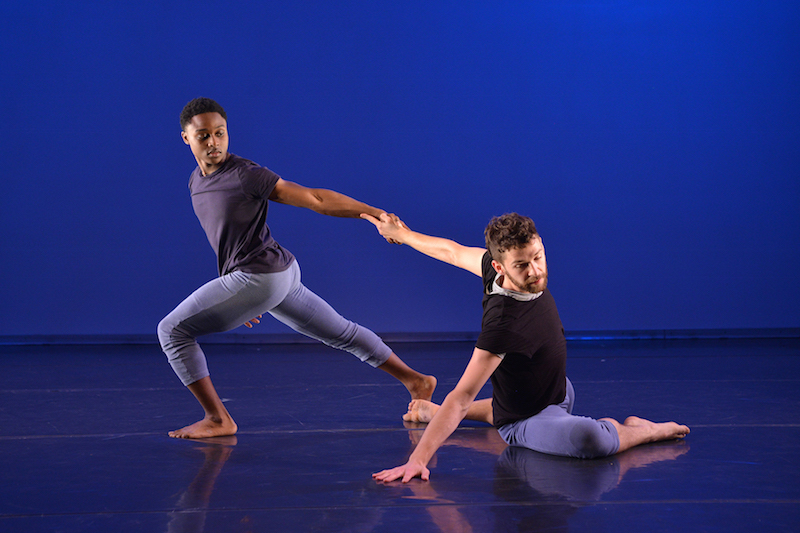
The University of Michigan Department of Dance trains young people to be excellent modern dancers and then frequently asks them to perform bafflingly academic pieces. Their most recent performance, Momentum, running at the Power Center from now until February 7th, showcased this duality. The first three pieces were all choreographed by Department of Dance faculty, and the finale by guest choreographer Camille A. Brown.
Momentum opened with a piece by local dance legend Peter Sparling. I generally like Sparling’s work, but recently he has become enamored of video projections which tend to overwhelm his choreography. His work for Momentum, “Big Weather,” featured not one but two video screens between which the dancers moved. The videos contained a strange mix of images, including stars, corpses, sandbags, and at one point, a stuffed elephant falling slowly from a table. The dancers wore heavy rubber boots that they took off and on throughout the piece, which was set to pounding and not particularly rhythmic percussion music. If I’m not describing much of the dancing, it’s because I was too distracted by the trappings of the piece to focus on the actual movement. At his best, Sparling, a former principal dancer with the Martha Graham Dance Company, can choreograph wonderfully thoughtful modern dance pieces. However, “Big Weather” seemed more the work of an artist who has been insulated within academia for a little too long.
I was worried about the issues that would plague the second piece, “Cheating, Lying, Stealing,” choreographed by Bill DeYoung, because the program notes described it as about “the relentless dog-eat-dog momentum of office dynamics.” But after a strange start featuring a fake tennis match (which I quickly forgot), “Cheating, Lying, Stealing” became a fun and fast piece that worked beautifully with the music choice. The lead dancer, dressed in silver lamé, danced with such a stunning and precise ferocity that I could easily understand why all of the others dancers were following her lead by the end.
Amy Chavasse’s piece “Goodbye to Wayward Flesh” showcased some of the younger and less experienced dancers and brought a great sense of play to Momentum. I had a hard time focusing on the beginning because I was preoccupied by a dummy that was covered in duct tape and tied up to a movable piece of shattered plexiglass at the back of the stage. I half-expected the dummy to turn out to be a real dancer who might pop out at any moment, so I braced myself for the surprise. I did not have this same fear with the life-size stuffed alpaca watching static on TV in the front of the stage, although I found it equally confusing. “Goodbye to Wayward Flesh” featured some nice partnering and the dancers, dressed as what I can only describe as futuristic merpeople, seemed to be truly enjoying themselves.
The last piece of the night was choreographed by Camille A. Brown, who will be bringing her new work Black Girl–Linguistic Play to the Power Center on February 13th. Brown’s piece, “City of Rain,” was far and away the best of the night. It would be worth going to see Momentum for this work alone, which allowed the Department of Dance to show off their most amazing dancers. Of particular note is Beynji Marsh, a junior from Chicago who could easily be mistaken for a professional dancer. Marsh’s precise control over his body is matched by the emotion and nuance he brought to the choreography. He is a true and notable talent and I look forward to seeing his dance career flourish. All of the dancers in “City of Rain” were excellent, and it was a moving and lovely end to the evening.
Stuffed alpacas and rubber boots aside, Momentum is worth your time. The dancers are talented, though their abilities were sometimes lost amid the choices of some of the more academic choreographers. Notably missing from Momentum was a piece from faculty member Robin Wilson, who is one of the most accessible and excellent choreographers in the Department of Dance. Wilson acted as Rehearsal Director for “City of Rain,” but it would have been great to have gotten an original work from her as well. I could have done with fewer video screens and unused but overbearing set pieces. My date for the evening, my father, suggested that the faculty be required to choreograph to only Katy Perry music for a year, just for the challenge. Although I’m more of a Taylor Swift fan myself, I can’t help but agree with the sentiment. In the meantime, get a ticket to Momentum and enjoy it for–and despite–all its weirdness.
Evelyn Hollenshead is a Youth Librarian at AADL and former dancer.
Momentum continues its run at the Power Center through this weekend, with performances Friday and Saturday, February 5 and 6 at 8 pm, and Sunday, February 7 at 2 pm. Tickets range from $22-$28, and students with ID can attend for $12.
Preview: Guys and Dolls, Huron High School
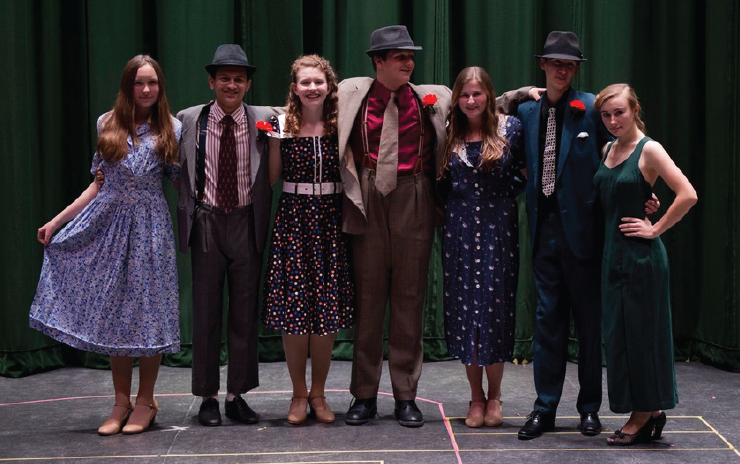
This weekend Huron High School's Huron Players present the musical Guys and Dolls, with direction by Jeffrey Stringer and music direction by Dr. Richard Ingram.
Guys and Dolls was adapted from two short stories by author and journalist Damon Runyon, whose colorful lifestyle beyond the pen as a chain-smoking gambler with a 40-cup-a-day coffee habit and close friends with gangsters, hustlers, and chorus girls shaped the endearing “Runyonesque” lowlifes that populate his tales with their distinctive gangster slang.
With music and lyrics by Frank Loesser, Guys and Dolls follows small-time gamblers Sky Masterson and Nathan Detroit as they wager with Lady Luck on the streets and back alleys of New York City. A big hit when it opened on Broadway in November 1950, the musical went on to win a Tony Award, inspire a 1955 film adaptation, and has seen several successful revivals over the decades.
"More I Cannot Wish You" but you’ll double your odds of catching more Guys and Dolls on the Power Center stage in April when the University of Michigan Department of Musical Theatre & Dance takes a chance on the show.
Amy Cantú is a Production Librarian at the Ann Arbor District Library.
Guys and Dolls runs Friday, February 5 - Sunday, February 7. Tickets: $15 for Adults and $10 for Students/Seniors/Staff. For more information and tickets, visit: the Huron Players website.
Preview: Chesapeake, Theatre Nova

A highlight of last year’s theater season was Theatre Nova’s critically lauded production of the Off Broadway smash comedy Buyer and Cellar, featuring a delightful Wilde-award nominated performance by Sebastian Gerstner. Local audiences will be excited to hear that Gerstner and the Buyer and Cellar creative team return to the Yellow Barn to kick off the 2016 season with a production of Lee Blessing’s political comedy Chesapeake.
Directed by Daniel C. Walker, this Michigan premiere showcases Sebastian Gerstner’s comedic skills in another hilarious one man show, this time as a performance artist so outraged by a conservative Republican senator and his anti-arts campaign that the he plots to kidnap the senator’s beloved Labrador Retriever. The caper does not unfold as planned, however, to amusingly disastrous results.
The play is inspired by a true event: the 1989 challenge by Jesse Helms over First Amendments rights and the National Endowment for the Arts. The play premiered in New York in 1999 and has since been performed throughout the U.S. The Chicago Sun-Times highly recommended Chesapeake, calling the play “hilarious, provocative, and blisteringly smart,” while the Baltimore Sun praised it as an “enriching play that entertains audiences and…redefines what a complete theater experience can become.”
Tim Grimes is manager of Community Relations & Marketing at the Ann Arbor District Library and co-founder of Redbud Productions.
Performances of Chesapeake begin Friday, February 5, and will run throughout the month, with performances on Thursday, Friday, and Saturday nights at 8 pm, and Sundays at 2 pm. For information, visit www.theatrenova.org or call 734-635-8450. All Theatre Nova shows are pay-what-you can, with a suggested donation of $20. Theatre Nova is located at The Yellow Barn, 416 W. Huron in Ann Arbor.
Review: Kickshaw Theatre goes bold with The Electric Baby
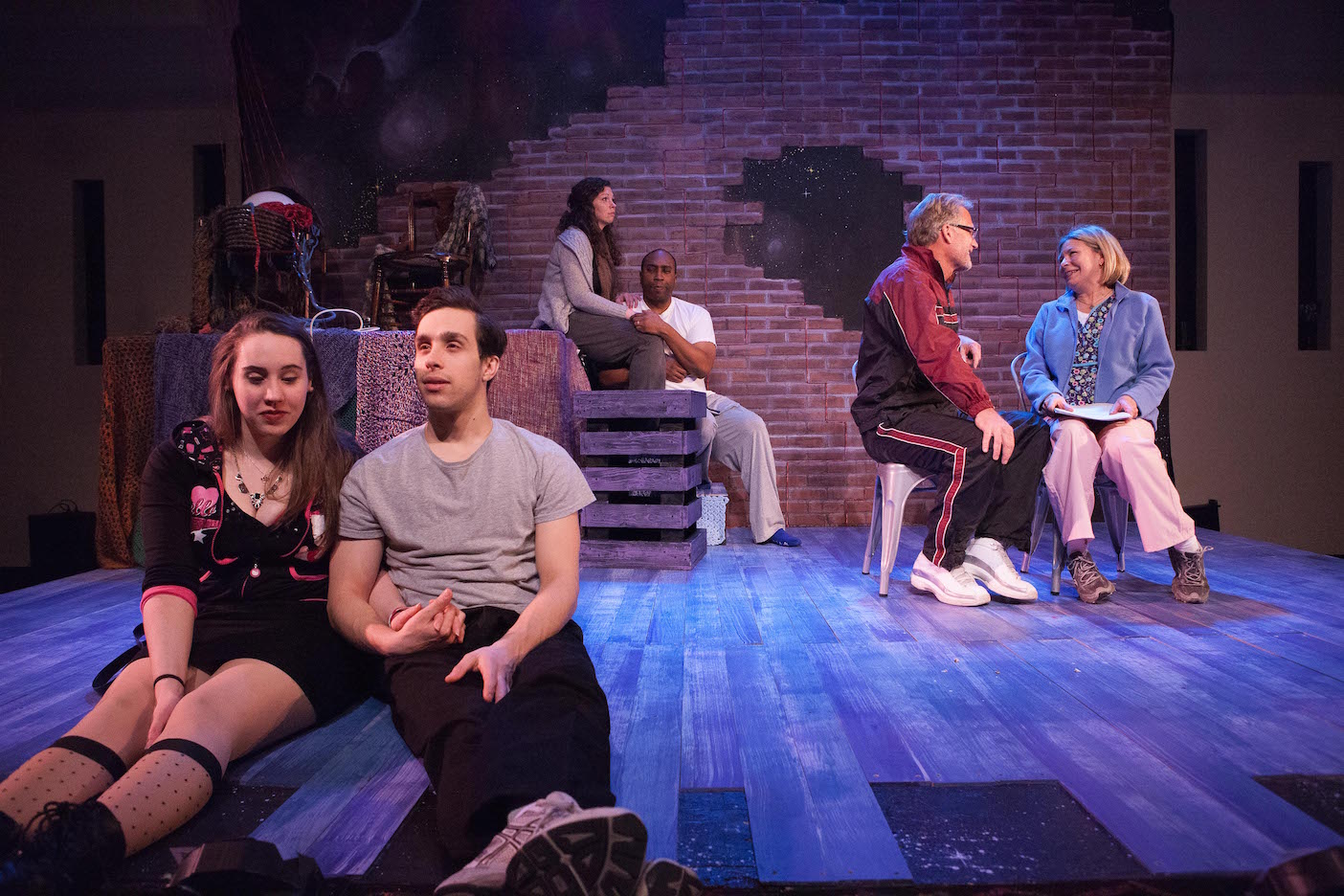
The new Kickshaw Theatre is kicking off with a bold promise that it will be presenting theater with a bite by staging Stefanie Zadravec's The Electric Baby as its first production.
The Electric Baby is a play with drama, humor and a social conscience. But it is also burdened by its shifting styles, its dips into magic realism and its central symbolic image, a baby that "glows like the moon."
In choosing to take on this particular play, director Lynn Lammers dares to challenge her audience to give in to the playwright's excesses to mine for the moments of gold. She has the benefit of directing an outstanding and dedicated cast that shares her sensitivity and seriousness to material that often seems too fragile.
An immigrant mother in a rundown apartment is our guide. The Romanian immigrant, Natalia, talks directly to the audience, suggesting helpful folk remedies or telling fanciful folk tales, all while rocking her baby. The baby is hope in an unusual form.
The action begins with a middle-aged couple engaged in a fierce argument while waiting for a valet to bring their car after visiting the husband of their deceased daughter. The woman becomes enraged and hurries into the night.
Nearby, an immigrant African cabdriver picks up a young man and woman who have just dramatically stormed out of their low-paying restaurant jobs but become embroiled in their own argument about the woman's side job as an "escort."
The taxi and the running woman collide, setting off a series of encounters. In the process Zadravec explores a myriad of social issues from the impact of loss on a longstanding marriage, the problems of aging in an economic downturn, the problems of the young forced into dead-end jobs, the problems of immigrants trying to make it in a less than friendly America. To do this, she moves back and forth from realism to folk tale and mysticism. But the Kickshaw cast makes it work.
Vanessa Sawson's Natalia is earthy, confiding, at times romantic. The accent sounds very credible. She is especially effective at drawing the audience in as she cajoles them with her old country remedies. She is also good at portraying the bitter struggle in her once hopeful life in America.
William Bryson as the cabdriver, Ambimbola, also has a credible accent that booms with authority. He also has a sardonic chuckle and a face that animates a hundred different emotions. This character is a beacon of hope that depends on Bryson's charm to work.
The married couple groping to repair a badly damaged marriage are played sharply by Julie Glander and Peter Carey. Glander at first is a bundled of nerves as Helen, grieving and blaming for too long. Gradually she learns how to channel her grief and Glander handles the transition beautifully. Carey's Reed is a difficult character hiding a secret and holding down his own grief until it boils over. Carey's rich voice gives special weight to Reed's attempts to evade and then accept his responsibilities.
Mary Dilworth plays the foul mouthed young prostitute, Rozie, with a perfect combination of childlike vulnerability and defiant brass. Dilworth snaps off a torrent of vulgarity while retaining that hint of the young girl she once was.
Michael Lopetrone rounds out the cast as Dan, Don and David. He makes each a little different. His stuttering Dan is never played for laughs or sympathy.
This is a strong beginning for a new company that might have played it safe the first time out. It will be interesting to see where they go from here.
Hugh Gallagher has written theater and film reviews over a 40-year newspaper career and was most recently managing editor of the Observer & Eccentric Newspapers in suburban Detroit.
The Electric Baby continues through Sunday, February 21 at the Interfaith Center for Spiritual Growth, 704 Airport Blvd, Ann Arbor, MI 48108. For tickets, visit kickshawtheatre.org or call Brown Paper Tickets at 1-800-838-3006.
Review: Purple Rose's Odd Couple Has Humor and Heart
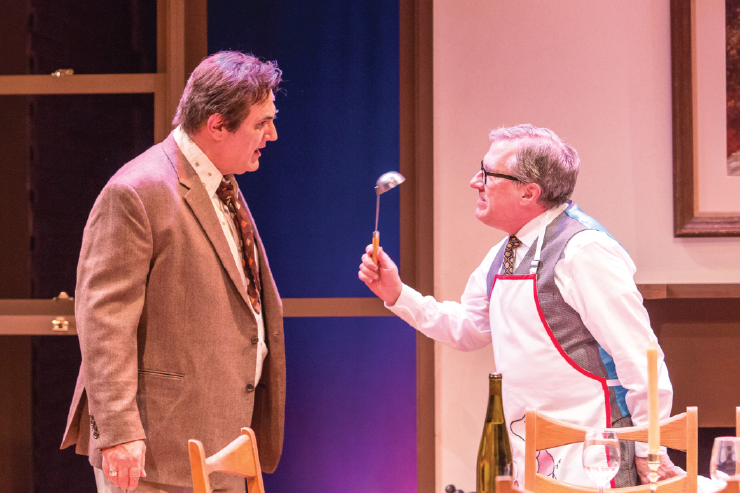
Oscar and Felix are back.
The most famous stage bromance, The Odd Couple, is as hilarious as ever at Chelsea's Purple Rose Theatre, where the jokes just keep coming but the play's underlying humanity rises to the top.
Neil Simon had a long, prolific and successful career, but The Odd Couple is probably his most enduring and most produced work. Following its box office success on Broadway and as a hit movie, it is produced regularly across the country and has even inspired a female version.
The Purple Rose makes their production special with an excellent cast in top form, hitting each zinger with perfect timing, while finding the play's heartfelt take on what it's like to be lonely in a big city.
The neat-freak, fuss budget Felix Ungar has been given the boot by his wife and his poker-playing buddy Oscar Madison, an uber masculine slob, reluctantly offers him temporary residence in his Manhattan apartment. The apartment has been too big and too empty since Oscar's divorce.
At the heart of this story are two men of opposite personalities who find a way to complement each other. Guy Sanville is the gruff, slovenly Oscar but with a look in his eyes that suggests a sensitivity befitting one of New York's top sports writers. He's funny in a sly, deadpan way. David Montee is a sweet-natured Felix, the slightly prissy man who enjoys cooking and can't stand a mess. Montee doesn't overdo the effeminate qualities as some actors would and instead emphasizes Felix's gentleness along with his irritating, but funny, perfectionism.
Lauren Mounsey makes her professional directing debut and does a fine job of keeping the mood droll and funny but also low key. The jokes are there and the audience laughs but they come out of real conversations. All of her actors are in sync which keeps things moving along hilariously.
The poker gang played by David Bendena, Jim Porterfield, Chris Lutkin and Tom Whalen kibbutz and razz each other with easy rapport. Porterfield is especially funny as the excitable cop Murray, whose agitation rises to a boil of nervous energy.
Oscar and Felix, of course, find female companionship in the form of the ever lovable Pigeon sisters, Gwendolyn (Michelle Mountain) and Cecily (Rhiannon Ragland). They twitter and fidget about as their surname suggests and all in sparklingly twitty English accents. Their scene with Felix is both funny and endearing.
The intimate Purple Rose setting is perfect for The Odd Couple, drawing the audience into Oscar's Manhattan apartment. Set designer Bartley H. Bauer does a good job of presenting a well-appointed apartment that has somewhat gone to seed under Oscar's disregard.
These are characters we all know so well from stage, movie and a hit TV series, but the Purple Rose gives them bright new life.
Hugh Gallagher has written theater and film reviews over a 40-year newspaper career and was most recently managing editor of the Observer & Eccentric Newspapers in suburban Detroit.
The Odd Couple continues through March 26 at the theater, 137 Park Street in Chelsea. Tickets range in price from $19 to $43 with discounts for students, seniors and groups. For more information or to make reservations, call the theater box office at (734) 433-7673 or go online to http://www.purplerosetheatre.org.
Review: National Theatre Live's Hamlet
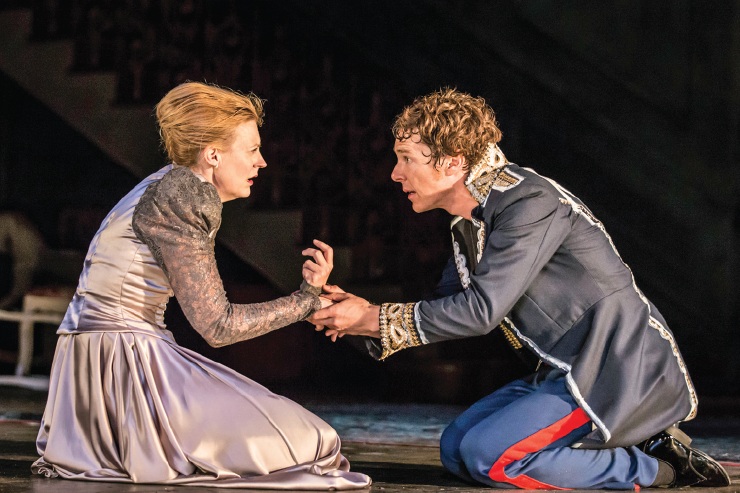
On Sunday, January 17th, the Michigan Theater showed an encore screening of the National Theatre Live’s production of Hamlet to a sold-out theater. Starring Benedict Cumberbatch, this production entirely reimagines the classic play and brings it into focus with a captivating clarity. It’s evident from the moment Hamlet enters the wedding celebration between his mother and his uncle that this is a dark play. The set is characterized by indigo hues and shadows, so that Elsinore, the Danish royal castle, appears both splendid and on the verge of decay.
Cumberbatch gives an excellent performance, delivering his lines with a convincing ease. This production presented Hamlet as more than a vengeful, petty step-son. Cumberbatch infuses Hamlet with purpose and emotional depth. His performance is anchored in the grief Hamlet feels over the death of his father, making Hamlet’s erratic behavior throughout the play more understandable.
War is constantly on the edges of the action; several scenes take place in a command room, antique swords and military paintings decorate the castle, and the second act includes scenes on a battlefield. Yet that constant threat is entirely overshadowed by domestic drama. Polonius and Claudius are only too willing to meddle in the lives of their children, taking time off from political matters to contrive meetings between Hamlet and Ophelia which are then watched from behind closed doors. In a way, it seems like the entire royal family is consumed, one way or another, by madness.
There are so many elements of this production that deserve praise. An inspired set design, created by Es Devlin, resulted in a broadcast that was almost like watching a typical movie. The only difference was that occasionally people would run onstage to shuffle things around in anticipation of upcoming scenes. The enclosed nature of the set, which was built at an angle to the front of the stage, almost seemed like it was designed with the camera in mind. Because the camera never captured any offstage action, it was easy to forget that you were watching a play. The downside of this cinematic quality is that the main room of Elsinore became a little claustrophobic over time, but the feeling dovetailed nicely with the themes explored by the production.
The second half of the play was characterized by low lighting, with spotlights targeting specific areas of the stage. During the final acts of the play, the entirety of the set is covered in piles of black debris and broken furniture, adding an unsettling element of discord to the Elsinore scenes. It seems as though a darkness or illness has burst out of the characters and been projected onto the rooms through which they move. The whole stage never seems to be visible, and that darkness overshadows the actions of the final scenes. We’ve reached the end of the play, and the end of almost every character onstage as the play culminates in a destructive whirlwind of a finale.
While I suspect that Cumberbatch’s popularity attracted many people to this broadcast, I got the impression that many of the people who saw the play with me enjoyed their overall experience. I know that I appreciated the chance to see a first-rate production at an affordable price. The filmed version of the play probably wasn’t quite as good as being there—I think you lose a bit of the interplay in energy between the audience and the actors—but I’d say this definitely satisfies as the next best thing. I would definitely recommend future versions of the live broadcasts for those of us who can’t jet off to London in time for the next big production.
Audrey Huggett is a Public Library Associate at the Ann Arbor District Library and knows a hawk from a handsaw.
Preview: The Electric Baby, Kickshaw Theatre

Kickshaw means “rare delight.” The term now also refers to Kickshaw Theatre, Ann Arbor’s newest professional theater company, whose first full production, The Electric Baby, by Stefanie Zadravec, opens on Thursday, January 28.
In alignment with their core values, Kickshaw Theatre has partnered with local organizations, including the Interfaith Center for Spiritual Growth, the Ann Arbor Storytellers Guild, and the Lamaze Family Center, to bring this magical drama to the Ann Arbor audiences.
The dark comedy The Electric Baby received its World Premiere in 2012 and, in addition to other awards, received the American Theatre Critics Association’s Francesca Primus Prize for an Emerging Female Playwright. Talkin’ Broadway raved that the play was “richly entertaining;” and The New York Times praised The Electric Baby as “gently touching” with a “mix of expressionism and magical realism.”
The plot revolves around six characters (Will Bryson, Peter Carey, Mary Dilworth, Julia Glander, Michael Lopetrone, and Vanessa Sawson) whose lives collide after a tragic car accident, forcing each to confront the secrets, hopes and fears that consume them, and helping them to find love, strength and forgiveness through a mysterious baby that glows like the moon. Kickshaw’s premiere production is directed by the Theatre’s artistic director and founder Lynn Lammers.
Take a chance to view this magically delightful new play with Ann Arbor’s brand new professional company!
Tim Grimes is manager of Community Relations & Marketing at the Ann Arbor District Library and co-founder of Redbud Productions.
Performances of The Electric Baby will run from Thursday, January 28 through Sunday, February 21 at the Interfaith Center for Spiritual Growth, 704 Airport Blvd, Ann Arbor, MI 48108. There are also several special performances featuring post- performance conversations with special guest organizations. For tickets, visit kickshawtheatre.org or call Brown Paper Tickets at 1-800-838-3006.
Review: Ann Arbor Symphony's Mozart Birthday Bash

Last Saturday, the Ann Arbor Symphony Orchestra celebrated Mozart’s birthday in style, with a performance of The Abduction from the Seraglio at the Michigan Theater. Opera is all about spectacle—elaborate sets, a cast of thousands—but the A2SO made a deliberate decision to highlight Mozart’s excellent music, which underpins the story. The A2SO brought in incredibly talented lead vocalists to round out the presentation of the opera, but decided to present a semi-staged version of the piece. The overall effect was that this was a performance for music lovers, with an emphasis on the songs within the opera, rather than the drama of the story.
The Abduction from the Seraglio is somewhere between a tragedy and a comedy. It tells the story of a pair of lovers, Belmonte and Constanze, and their servants, Pedrillo and Blondchen. The opera opens after Constanze and Blondchen have been kidnapped and taken to the titular seraglio (which turns out to be a harem) of Pasha Selim, Sultan of Turkey. The Pasha has fallen in love with Constanze, who resists his advances and remains true to Belmonte. Blondchen, meanwhile, has attracted the attention of Osmin, who guards the seraglio. The opera centers on the trials of the lovers as they try to find a way to escape the seraglio. There is a lot of singing about the pain of being separated from a lover and how painful love can be. Our heroes are ultimately released by a suddenly benevolent Pasha, who is moved by the strength of the love between Constanze and Belmonte.
A narrator verbally bridged the action between each song, providing background information and a quick summary of the plot. It was a clever device that allowed the focus to remain on the music of the opera, and, perhaps more importantly, it was an entry point for opera newbies. Those not previously familiar with The Abduction from the Seraglio might have had a difficult time following the action and emotion through lines of the opera, particularly since it was performed in German. Between the narrator and the lyrics projected on a small screen above the orchestra, there was no need to have memorized the entirety of the opera beforehand.
The real standout stars of the opera, among the vocalists, were the female performers Jeanette Vecchione and Suzanne Rigden. Vecchione played the part of Constanze with a wonderful gravity. Vecchione was also remarkable in her ability to keep pace with the full orchestra immediately behind her. There were moments, particularly in fire and brimstone songs, where the vocalists could get a little drowned out by the full orchestra directly behind them. This was not so with Vecchione, a testament to her skill as a vocalist. Rigden brought a wonderful lightness and humor to the stage, and was a real joy to watch. All of the vocalists deserve mention for excellent performances.
I haven’t said much about the orchestra itself, and that’s because the performance was essentially flawless. The orchestra blended into the background, supporting the vocalists’ performances, which is what you want in this sort of setting. It was interesting to get a sense of the music through the movement of the bows on the stringed instruments, however it was impossible to resist the action of the story communicated through the vocalists on stage.
The close quarters of the semi-staging helped to underscore the natural humor written into The Abduction from the Seraglio. Pushing all of the vocalists into close quarters helped up some of the dramatic tension. The downside was that the actors didn’t always have much to do, but this performance was always focused on the music of the opera. The performance was a joy to watch, and proved to be an accessible entry point into the world of opera.
Audrey Huggett is a Public Library Associate at the Ann Arbor District Library and has never seen an opera before.
The Ann Arbor Symphony Orchestra's next Main Stage event will be Harp Magic on March 12 at the Michigan Theater.
Sometimes Pointless Things are Worth It: Pointless Brewery Opens in A2

The pointless dreams of husband and wife team Jason and Tori Tomalia came true in mid-December as their Pointless Brewery & Theatre opened on Packard in Ann Arbor. The idea that had been brewing for over a decade came to fruition after Tori was diagnosed with stage IV lung cancer and they were asking themselves what the point of everything was.
The answer: sketch comedy and beer.
The brewery and theater offers a delightful combination of improv and craft beer made by the owner, and from my experience both were worth the ticket. The sketch comedy is provided by three different improv groups each night, including their resident group — The League of Pointless Improvisers. It is definitely more of a bar in a theater than a theater in a bar, as the long-form improv performances are the focus. The small space may have a small stage and a small bar but it has a giant heart – which creates a welcoming and relaxed environment for theater-goers. Owner and brewer Jason Tomalia is quick to tell you that if you feel like grabbing a beer or one of their made-in-Michigan snacks in the middle of the show, go right ahead.
Amanda Schott is a Library Technician at AADL and sometimes snorts when she laughs at improv comedy.
Improv Shows are Fridays at 8 pm, and Saturdays at 8 pm and 10:30 pm. For the kids there’s Little Peeps every Saturday morning at 10:30 am. It is part performance, part drama activities, and part crafts. And Sundays at 7 pm is open stage night where you can sign up to show off your own talents such as music, improv, poetry, etc. The theater also offers improv classes on site.
Review: Civic Theatre Cast Brings out Their Best for 'Company'

Intimate relationships are complicated, contradictory, and baffling.
Company is a musically and lyrically intense exploration of love and marriage, at times rueful, funny, bitter and hopeful. The musical, with music and lyrics by Stephen Sondheim and book by George Furth, is musically challenging, lyrically intricate, and emotionally draining. The Ann Arbor Civic Theatre has taken on the challenge with an outstanding ensemble who seem to relish the rich variety and tonal changes of Sondheim's music.
Director Rachel Francisco notes in the program that the play has an odd structure. The center of attention is Bobby, an aging man-about-town who has reached his 35th birthday without settling into a serious relationship. He is surrounded by married friends who both envy and worry about him. Bobby visits these couples and struggles with who he is and who he is supposed to be. Francisco notes that the action seems to play out in Bobby's head, a meditation on life, ending with a desperate affirmation.
Company is well named as the play provides spotlight moments for many in the cast, each song keying in on some aspect of love and marriage. Francisco and musical director Jennifer Goltz keep it fluid, moving easily from moments of slapstick humor to quiet introspection. Sondheim draws on jazz, the blues, and musical theater models. His multi-voiced settings, complex lyrics at breakneck speed, and his shifts in style are a challenge. Goltz gets the best from the singers and leads a small combo in a solid musical accompaniment.
At the center is Robby Griswold as Bobby. He is our guide through this mid-life crisis. He is charming, boyish, but also visibly aching for something else...or is he? Griswold is the glue that binds everything with his nuanced performance and his rich, intelligent singing. He wonders about the limits of intimacy in the reflective "Marry Me a Little." His rendition of "Being Alive" is strong, sad but triumphant.
But, of course, Bobby is not alone. He is surrounded and sometimes smothered by the affection of his friends.
Harry and Sarah seem happily married, even as they engage in a little karate. Jodi-Renee Giron's Sarah is tough and funny. Harry may not be all that happy as he sings "Sorry-Grateful," one of the most mature reflections on marriage. Paul Clark as Harry has a strong voice that captures the rueful mood.
Marta, a bohemian girl, is one of three people with whom Bobby has off-and-on relations. Kate Papachristou has a voice that seems to rise above the others. Her Marta offers one explanation for Bobby's reluctance to get involved, the teeming, stimulating, maddening city of New York, in the frantic song, "Another Hundred People."
Another frantic song is from a bride in panic as the ceremony nears. Marci Rosenberg is hilarious as Amy, a woman in a longterm lesbian relationship who feels too much pressure to get married. Sondheim's "Getting Married Today," is a rapid fire musical stand-up routine that Rosenberg blazes through, while flailing across the stage hilariously. Her sweet-tempered, kind intended, Paula, is well played by Amanda Bynum.
April is another of Bobby's tentative love relationships. She's a stewardess, more noted for her beauty than her intellect, a definite bad mark from Bobby's female friends. Kimberly Elliott is funny and a little goofy as April and she and Griswold do a nice comic duet on "Barcelona".
A knock-out moment in Company is always Joanne's bitter observations on "The Ladies Who Lunch." Joanne and her third husband are a bit older than the crowd. As played by Amy Bogetto-Weinraub, she is a bit of a cougar, always on the hunt but more than a little sad about her situation. Her performance on "The Ladies" builds slowly to a savage, emotionally draining declaration that is more about self-loathing than gossip.
Others of note are Trisha Fountain as the square Jenny, Chris Joseph as the bisexual Bobby's sometimes boyfriend Kevin, and in the musical quartet, Greg Simon on trumpet and flugel.
Hugh Gallagher has written theater and film reviews over a 40-year newspaper career and was most recently managing editor of the Observer & Eccentric Newspapers in suburban Detroit.
Company continues Friday and Saturday at 8 p.m. and Sunday at 2 p.m. at the Arthur Miller.Arthur Miller Theatre, 1226 Murfin Ave, 48109. Tickets are available online at Ann Arbor Civic Theatre's website, by calling the A2CT office at 734-971-2228, or at the door. Additional information is available by visiting the theater's website.


































